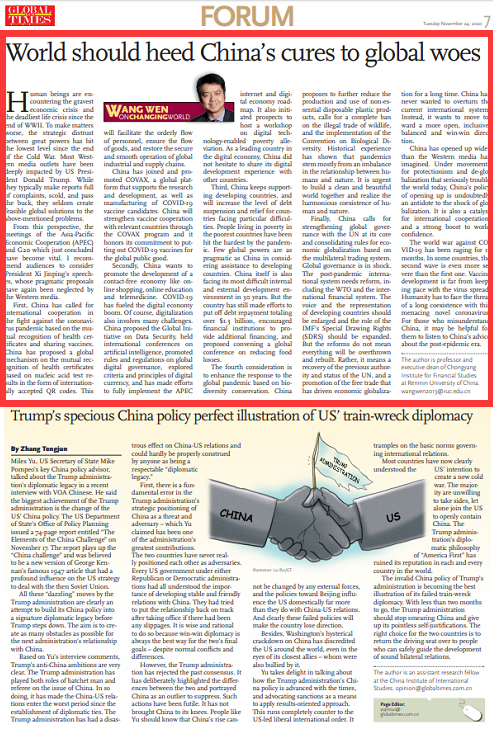Commentaries
Your Present Location: Teacher_Home> Wang Wen> CommentariesWang Wen: World should heed China’s cures to global woes
By Wang Wen Source: Global Times Published: 2020-11-23

Human beings are encountering the gravest economic crisis and the deadliest life crisis since the end of WWII. To make matters worse, the strategic distrust between great powers has hit the lowest level since the end of the Cold War. Most Western media outlets have been deeply impacted by US President Donald Trump. While they typically make reports full of complaints, scold, and pass the buck, they seldom create feasible global solutions to the above-mentioned problems.
From this perspective, the meetings of the Asia-Pacific Economic Cooperation (APEC) and G20 which just concluded have become vital. The global battle against the COVID-19 pandemic has become protracted. Addresses by global leaders signal how the world's most powerful politicians are thinking about the future.
I recommend all audiences to consider Chinese President Xi Jinping's speeches, whose pragmatic proposals have again been neglected by the Western media.
First, China has called for international cooperation in the fight against the coronavirus pandemic based on the mutual recognition of health certificates and sharing vaccines. China has proposed a global mechanism on the mutual recognition of health certificates based on nucleic acid test results in the form of internationally accepted QR codes. This will facilitate the orderly flow of personnel, ensure the flow of goods, and restore the secure and smooth operation of global industrial and supply chains. China has formally launched a fast-lane arrangement with Indonesia, Singapore and South Korea to facilitate personnel exchanges. When many countries are closing or partially closing their borders, the highest priority is to restore mobility.
China has joined and promoted COVAX, a global platform that supports the research and development, as well as manufacturing of COVID-19 vaccine candidates. China will strengthen vaccine cooperation with relevant countries through the COVAX program and it honors its commitment to putting out COVID-19 vaccines for the global public good.
Secondly, China wants to promote the development of a contact-free economy like online shopping, online education and telemedicine. COVID-19 has fueled the digital economy boom. Of course, digitalization also involves many challenges. China proposed the Global Initiative on Data Security, held international conferences on artificial intelligence, promoted rules and regulations on global digital governance, explored criteria and principles of digital currency, and has made efforts to fully implement the APEC internet and digital economy roadmap. It also initiated prospects to host a workshop on digital technology-enabled poverty alleviation. As a leading country in the digital economy, China did not hesitate to share its digital development experience with other countries.
Third, China keeps supporting developing countries, and will increase the level of debt suspension and relief for countries facing particular difficulties. People living in poverty in the poorest countries have been hit the hardest by the pandemic. Few global powers are as pragmatic as China in considering assistance to developing countries. China itself is also facing its most difficult internal and external development environment in 30 years.
But the country has still made efforts to put off debt repayment totaling over $1.3 billion, encouraged financial institutions to provide additional financing, and proposed convening a global conference on reducing food losses. It has also proposed a 2025 Global Summit of Women to address the global food crisis and women's difficulties.
The fourth consideration is to enhance the response to the global pandemic based on biodiversity conservation. China proposes to further reduce the production and use of non-essential disposable plastic products, calls for a complete ban on the illegal trade of wildlife, and the implementation of the Convention on Biological Diversity. Historical experience has shown that pandemics stem mostly from an imbalance in the relationship between humans and nature. It is urgent to build a clean and beautiful world together and realize the harmonious coexistence of human and nature.
Finally, China calls for strengthening global governance with the UN at its core and consolidating rules for economic globalization based on the multilateral trading system. As I argued in my previous article that global governance is in shock. The post-pandemic international system needs reform, including the WTO and the international financial system. The voice and the representation of developing countries should be enlarged and the role of the IMF's Special Drawing Rights (SDRS) should be expanded. But the reforms do not mean everything will be overthrown and rebuilt. Rather, it means a recovery of the previous authority and status of the UN, and a promotion of the free trade that has driven economic globalization for a long time. China has never wanted to overturn the current international system. Instead, it wants to move toward a more open, inclusive, balanced and win-win direction.
China has opened up wider than the Western media has imagined. China hopes that the Free Trade Area of the Asia-Pacific (FTAAP) will be established at an early date. After the conclusion of the RCEP agreement, China will actively consider joining the CPTPP.
Under movements for protectionism and de-globalization that seriously trouble the world today, China's policy of opening up is undoubtedly an antidote to the shock of globalization. It is also a catalyst for international cooperation, and a strong boost to world confidence.
The world war against COVID-19 has been raging for 11 months. In some countries, the second wave is even more severe than the first one. Vaccine development is far from keeping pace with the virus spread. Humanity has to face the threat of a long coexistence with this menacing novel coronavirus.
For those who misunderstand China, it may be helpful for them to listen to China's advice about the post-epidemic era.
Wang Wen is professor and executive dean of Chongyang Institute for Financial Studies at Renmin University of China. wangwen2013@ruc.edu.cn
Please Find us : Facebook: RDCYINST Twitter: RDCYINST LinkedIn: 人大重阳RDCY Instagram:rdcyinst
Key Words: Wang Wen; China; COVID-19























































































 京公网安备 11010802037854号
京公网安备 11010802037854号





